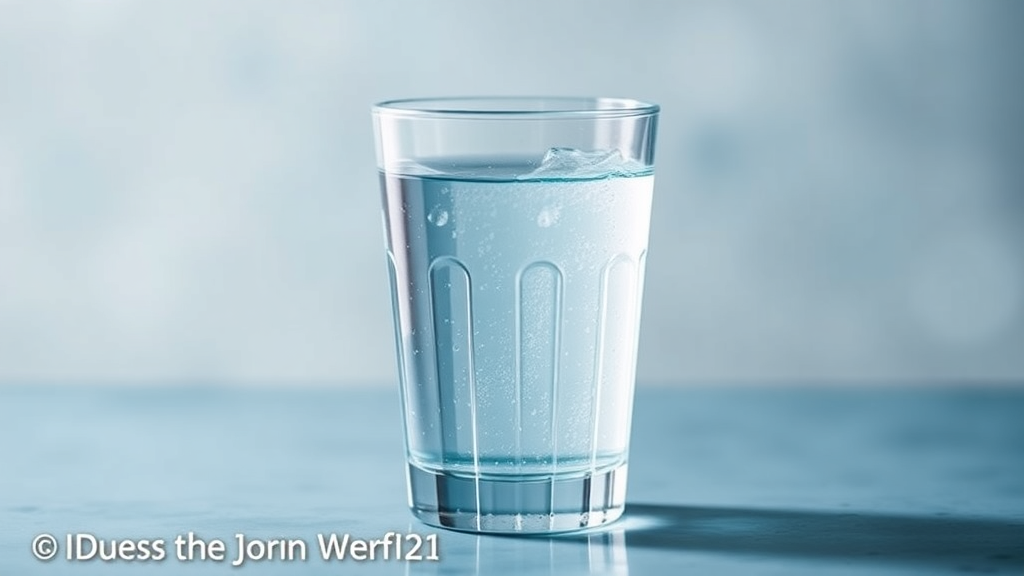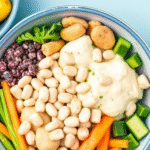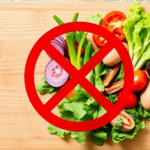Optimal Water Intake for Weight Loss
Understanding the right amount of water to drink can make a big difference in your weight loss journey. While many factors impact your goals, hydration plays an essential role. So, how much water should you consume to help shed those extra pounds?
Generally, drinking enough water can assist with weight loss in several ways:
- Water suppresses appetite, helping you eat less.
- Drinking water boosts metabolism.
- Water is crucial for burning fat.
- Increased hydration helps in exercise performance.
Research suggests that you should aim for around 8 to 10 cups (64 to 80 ounces) of water daily. However, the exact amount may differ based on various factors including weight, activity level, and climate. Here’s a clearer breakdown:
| Body Weight (lbs) | Water Intake (oz/day) |
|---|---|
| 100 | 50 |
| 150 | 75 |
| 200 | 100 |
| 250 | 125 |
The table above provides an estimate of how much water you should aim to drink daily based on your body weight. Remember, these numbers are simply guidelines; your personal needs might vary. Adjust your intake if you engage in exercise or spend time in hot weather, as both will increase your hydration needs.
Another important tip is to drink water before meals. Research published in the journal Obesity shows that drinking water before eating can reduce calorie intake, leading to weight loss over time. Consider drinking a glass of water about 30 minutes before each meal to help curb your appetite.
The type of water you drink can also have an impact. Some people prefer flavored water to make it more appealing. Natural flavorings, such as lemon, cucumber, or mint, can encourage you to drink more water without added sugars or calories. Additionally, sparkling water can be a refreshing alternative that satisfies cravings for carbonation.
It’s also worth noting that hydration doesn’t only come from beverages. Foods can contribute significantly, too. Foods rich in water, like fruits and vegetables, can help maintain your hydration levels. Consider adding the following to your diet:
- Watermelon
- Cucumber
- Spinach
- Strawberries
- Celery
Monitoring your hydration is easier than it might seem. A simple rule of thumb is to check the color of your urine. If it’s light yellow, you’re likely well-hydrated. Darker urine may indicate you need more water. This is a quick, effective way to stay on track with your weight loss goals.
Staying mindful of your water intake is essential for anyone wanting to lose weight. water as part of your daily routine can create significant changes over time. Here are some additional strategies to help integrate more water into your diet:
- Keep a water bottle with you at all times.
- Set reminders on your phone or use apps designed for hydration tracking.
- Drink a glass of water when you wake up each morning.
- Limit sugary drinks and sodas; replace them with water instead.
If you find yourself struggling to drink enough water, consider consulting with a nutritionist or health professional. They can personalize your hydration plan based on your specific weight loss goals.
Knowing how much water to drink is a vital piece of the weight loss puzzle. For more tips and resources on effective weight loss methods and hydration, visit Healthline and WebMD. Start drinking more water today and watch your weight loss journey gain momentum!
The Role of Hydration in Metabolism
Hydration plays a crucial role in your body’s metabolism, influencing everything from energy levels to weight management. Whether you’re trying to shed pounds or simply maintain a healthy lifestyle, understanding how water affects your metabolism is vital. Let’s explore how staying adequately hydrated can improve your metabolic processes and overall health.
Water is key to various biochemical reactions in your body, particularly those involved in metabolism. When you consume food, your body must break it down into nutrients that can be absorbed and used for energy. This process requires adequate hydration. Insufficient water intake can slow down digestion and hinder the effective breakdown of food, ultimately leading to less energy being available for your daily activities.
Here are some specific ways that hydration plays a role in metabolism:
- Thermogenesis: Drinking water can temporarily boost your metabolic rate. Studies have indicated that drinking about 500 ml of water can increase resting energy expenditure by approximately 30% for about 30-40 minutes.
- Appetite Regulation: Drinking water before meals can lead to reduced calorie intake. It can create a feeling of fullness, which may help you consume fewer calories and assist in weight loss.
- Fat Oxidation: Sufficient hydration is essential for fat metabolism. Water helps transport nutrients and plays a role in the breakdown of fat into energy.
- Preservation of Muscle Mass: Dehydration can lead to muscle loss, which is detrimental to metabolic health. More muscle mass increases your resting metabolism, allowing you to burn more calories even at rest.
- Detoxification: Proper hydration aids the kidneys in filtering waste, ensuring that toxins are flushed from your body efficiently. This detox process is essential for maintaining optimal metabolic functions.
It’s crucial to recognize that the amount of water you need can vary depending on several factors, such as your age, weight, activity level, and overall health. While a common recommendation is to drink at least eight 8-ounce glasses of water a day (commonly referred to as the “8×8” rule), individual hydration needs may be different.
To better understand your hydration needs, consider the following:
| Factor | Recommended Water Intake |
|---|---|
| Adults | 2.7-3.7 liters (for women); 3.7-4.7 liters (for men) |
| Active Individuals | 2-3 additional cups for every hour of exercise |
| Pregnant Women | Approximately 3 liters daily |
| Lactating Women | Approximately 3.8 liters daily |
Nature provides you with easy options to monitor your hydration. Your body is an excellent indicator; thirst signals mean you need to drink more. Checking the color of your urine is also a reliable method—pale yellow suggests proper hydration, while dark yellow may indicate the need for more fluids.
It’s essential to note that hydration needs can also be met through fluids in foods. Many fruits and vegetables, such as cucumbers, tomatoes, and oranges, have high water content and can contribute to your daily intake.
While staying hydrated is essential, it’s equally vital to understand when and what to drink for maximum metabolic benefits.
Consider these tips to optimize your hydration strategy:
- Start your day with a glass of water to kick-start your metabolism.
- Drink a glass of water 30 minutes before meals to promote fullness.
- Carry a water bottle with you to make drinking water more convenient.
- Include hydrating foods in your diet to boost overall fluid intake.
Hydration is more than just drinking water; it’s about maintaining balance in your body. Maintaining adequate fluid levels can significantly impact your metabolic health and offer a pathway to weight management. For more insights on hydration and wellness, check out this article from the National Institutes of Health and explore this guide on the importance of water by Healthline.
Always listen to your body and adjust your water intake based on your individual needs. Proper hydration is a simple yet powerful tool for better metabolic health and effective weight loss.
Daily Water Needs: How to Calculate Yours
Staying hydrated is essential for your overall health, and knowing how much water you need daily can help you maintain weight and improve your fitness. Different factors influence your hydration needs, including your age, sex, weight, activity level, and climate. Let’s look at how you can calculate your daily water needs effectively.
Understand Your Baseline Needs
The average daily water intake recommendation is about 3.7 liters (or 13 cups) for men and 2.7 liters (or 9 cups) for women, as per the USDA. However, these amounts can vary greatly based on individual factors.
Factors Affecting Water Needs
To get a more accurate calculation of your daily water needs, consider the following factors:
- Body Weight: Generally, you should drink about 30 to 35 milliliters of water per kilogram of body weight. For example, if you weigh 70 kg (approximately 154 lbs), your daily water requirement will be around 2.1 to 2.45 liters.
- Activity Level: If you sweat a lot during workouts or are physically active, you’ll need to drink more water. A good rule of thumb is to add an extra 500 to 700 ml for each hour of exercise.
- Climate: Hot or humid weather may increase your need for fluids. If you live in a warm environment, consider adding another 500 ml to your daily intake.
- Diet: If your diet is high in protein or salt, you might need more water. Eating lots of fruits and vegetables can help hydrate you, as they also contain water.
Calculating Your Water Needs
To calculate your personalized daily water intake, you can use this simple formula:
- Step 1: Calculate your body weight in kg.
- Step 2: Multiply your weight by 30 to 35 ml (or 0.03 to 0.035 liters).
- Step 3: Adjust based on your activity level and environmental factors.
For example:
- Weight: 70 kg
- Daily intake: 70 kg x 30 ml = 2100 ml (or 2.1 liters)
- Plus extra for exercise (1 hour): 500 ml
- Total daily needs: 2600 ml (or 2.6 liters)
Signs of Dehydration
It’s essential to listen to your body to avoid dehydration. Here are some common signs:
- Thirst
- Dark yellow urine
- Dry mouth and skin
- Fatigue
- Headaches
If you experience these signs, increase your water intake immediately. Make it a habit to carry a reusable water bottle to remind yourself to drink water throughout the day.
Timing Your Water Intake
To optimize hydration, consider timing your water consumption strategically:
- Upon Waking: Drink a glass of water first thing in the morning to kickstart your hydration.
- Before Meals: Drinking water before meals can help control appetite, which may assist you in weight management.
- Post-Workout: Rehydrate after activities to replenish lost fluids.
Water Alternatives
While plain water is the best choice, there are alternatives to help you stay hydrated:
- Herbal teas
- Infused water with fruits or herbs
- Fruits and vegetables with high water content, such as cucumbers and oranges
Determining your daily water needs involves understanding personal factors like body weight and activity level. By keeping track of your hydration, you can maintain an optimal level that supports your health, energy, and weight-loss goals. For more on hydration tips and related topics, you may visit CDC for reliable health information.
The Effects of Dehydration on Weight Loss Efforts
Water is often referred to as the elixir of life, playing critical roles in various body functions, including digestion, metabolism, and your overall health. When it comes to shedding those extra pounds, staying properly hydrated can be a game-changer. But what happens when you’re not drinking enough water? Dehydration can significantly hinder your weight loss efforts.
Understanding Dehydration
Dehydration occurs when your body loses more fluids than it takes in. This can lead to numerous health complications, especially when you’re on a weight loss journey. When you’re not getting enough water, your body can struggle to function optimally, impacting everything from your metabolism to your cravings.
The Impact of Dehydration on Metabolism
Your metabolism governs the rate at which your body burns calories. A well-hydrated body can burn calories more efficiently. Conversely, dehydration can slow down your metabolism, making it harder to lose weight. Studies indicate that even mild dehydration can reduce metabolic rates. When your metabolism decreases, your body becomes less effective at burning fat, making weight loss more challenging.
Hydration and Appetite Regulation
Water plays a crucial role in regulating appetite. Often, people confuse thirst for hunger. This misconception could lead to unnecessary snacking and increased calorie intake. Staying hydrated helps you identify true hunger cues and reduces the likelihood of eating when you’re actually just thirsty.
Here are some benefits of hydration on appetite regulation:
- Water fills your stomach, which can signal to your brain that you’re full.
- Hydrated bodies tend to have better energy levels, reducing cravings for quick-fix snacks.
- Proper hydration supports digestion, which can prevent bloating and discomfort that often confuse hunger signals.
How Dehydration Affects Workouts
Exercise is a fundamental part of any weight loss strategy. Proper hydration is essential for optimal performance during workouts. When dehydrated, your physical performance can decline, leading to:
- Reduced endurance and stamina
- Increased risk of cramps and injuries
- Lower overall workout intensity and duration
In short, if you aim to burn more calories through exercise, it’s essential to stay hydrated. Lack of hydration could mean fewer calories burned and slower weight loss progress.
Water Intake Recommendations for Weight Loss
While individual water needs may vary, here are some general guidelines to help you determine how much water to drink while trying to lose weight:
- Base Recommendation: Aim for at least 8-10 cups (64-80 ounces) of water daily.
- Before Meals: Drink a glass (8 ounces) of water about 30 minutes before meals to help control appetite.
- During Workouts: Drink water before, during, and after exercise, about 1 cup (8 ounces) for every 20 minutes of activity.
Listening to your body is crucial. Factors like climate, exercise intensity, and overall health can affect your hydration needs. Pay attention to signs such as thirst and the color of your urine; clear or light yellow indicates proper hydration.
Hydration into Your Routine
Making hydration a habit is vital. Here are some practical tips:
- Carry a reusable water bottle to track your intake.
- Eat water-rich foods like cucumbers, oranges, and lettuce.
- Set reminders on your phone to take water breaks.
By prioritizing hydration, you can enhance your weight loss journey significantly. You can find more information and tips on hydration and weight loss at Healthline or NCBI.
It’s vital to remember that hydration enhances not only weight loss efforts but also general well-being. So, grab that water bottle and make hydration a priority. Your body—and waistline—will thank you.
Hydrating Foods: A Complement to Your Water Intake
Staying hydrated is not just about drinking water; it’s also about incorporating hydrating foods into your diet. These foods can significantly contribute to your overall fluid intake and help you maintain optimal hydration levels. They are particularly beneficial for those who may struggle to drink enough water throughout the day. Here’s a look at some delicious and hydrating foods that you can easily add to your meals and snacks.
Fruits That Pack a Hydration Punch
Fruits are not only sweet and satisfying; many varieties have high water content, making them perfect for hydration. Here are some of the best fruits to consider:
- Watermelon: Composed of about 92% water, this refreshing fruit is perfect for summer and is low in calories.
- Cucumber: Technically a fruit, cucumbers are approximately 95% water. They make for a crunchy snack that adds hydration.
- Strawberries: With about 91% water content, they are also rich in vitamins and antioxidants.
- Cantaloupe: This melon contains around 89% water and is also a good source of vitamins A and C.
- Oranges: Juicy and sweet, oranges have about 86% water and offer a burst of hydration along with vitamin C.
Vegetables Loaded with Water
Alongside fruits, vegetables can also play a key role in keeping you hydrated. Incorporate these water-rich options into your meals:
- Celery: This vegetable contains about 95% water. It’s great in salads or as a snack with dips.
- Lettuce: Different types of lettuce, especially romaine, consist of approximately 95% water.
- Tomatoes: Offering around 94% water content, tomatoes can be used in salads, sauces, or eaten raw.
- Spinach: With about 91% water, spinach is not only hydrating but also packed with nutrients.
- Bell Peppers: Crunchy and colorful, bell peppers are approximately 92% water, perfect for snacking or in dishes.
Other Hydrating Choices
Besides fruits and vegetables, other food items can help keep your hydration levels up:
- Soups and Broths: Broth-based soups are an excellent way to up your fluid intake. They provide hydration along with essential nutrients.
- Yogurt: With about 88% water, yogurt serves as a creamy and nutritious snack. Look for choices with live cultures for added benefits.
- Smoothies: Blend hydrating fruits and vegetables for a vitamin-packed drink that helps you stay hydrated.
Smart Tips for Hydrating Foods
To effectively incorporate these hydrating foods into your routine, consider these tips:
- Start your day with a hydrating fruit salad or smoothie.
- Snack on celery sticks or bell pepper slices while working or studying.
- Add sliced cucumbers or tomatoes to your sandwiches or wraps.
- Make a refreshing salad with leafy greens and juicy fruits.
Remember, while hydrating foods contribute to your overall water intake, they should complement your fluid consumption rather than replace it. Aim for a balanced approach combining both water and hydrating foods for optimal hydration.
Here are a few resources to learn more about hydration and healthy eating:
- CDC – Healthy Water: Nutrition
- Healthline – Hydrating Foods
- Mayo Clinic – Nutrition and Healthy Eating
Hydrating foods into your diet not only enhances your hydration but also improves your overall nutrition. These choices are a delightful and effective way to support your water intake each day.
Myths and Facts About Water Consumption for Weight Loss
When it comes to weight loss, many people have questions about water consumption. You might have heard various claims about how drinking more water can help you shed those extra pounds. But what’s true and what’s just a myth? Understanding the facts about water consumption can help you make informed decisions on your weight loss journey.
Myth 1: Drinking more water will directly cause weight loss
While staying hydrated is crucial to your health, drinking excessive amounts of water alone will not directly lead to weight loss. However, water does play an essential role in various bodily functions that support weight management. Keeping hydrated can help with:
- Appetite control: Drinking water before meals may help you feel fuller, leading to reduced calorie intake.
- Metabolism boost: Some studies suggest that drinking cold water may slightly increase your metabolism, as your body burns calories to heat the water to body temperature.
- Improved digestion: Adequate water consumption helps in better digestion, which can contribute to overall health and wellness.
Myth 2: All drinks count toward your daily water intake
While beverages like tea, coffee, and juice can contribute to hydration, they sometimes include added sugars and other calories. The best source for hydration is still plain water. For those serious about their weight loss, it’s advisable to focus primarily on water consumption rather than sugary or calorie-laden drinks.
Fact: There is no one-size-fits-all answer
Your water needs can vary based on several factors, including activity level, climate, and overall health. On average, adults should aim for about 8-10 cups (64-80 ounces) of water per day. However, a better method to estimate your specific needs is to consider the following:
- Half of your body weight (in pounds) equals the number of ounces of water you should aim for daily. For example, a 160-pound person should target around 80 ounces of water each day.
- In hot climates or during intense exercise, you may need to increase your water intake further.
Myth 3: Drinking water before meals is a waste
Some people believe that drinking water before a meal isn’t beneficial. In reality, it can be quite the opposite! Drinking water before meals can help control hunger and may prevent overeating. If you drink a glass of water around 30 minutes before your meal, you might feel less hungry.
Fact: Hydration and exercise go hand in hand
For individuals looking to lose weight, pairing hydration with exercise can yield impressive results. Proper hydration supports endurance and performance during workouts. Dehydration can lead to fatigue, decreased motivation, and increased risk of injury, all of which can hinder your weight loss goals. It’s advisable to:
- Drink water before, during, and after your workout to maintain hydration levels.
- Listen to your body—if you feel thirsty, take a sip!
Debunking Additional Myths
Here are a few more common myths surrounding water consumption and weight loss:
| Myth | Fact |
|---|---|
| You must drink 8 glasses of water daily for everyone. | Individual needs may vary based on health, exercise, and personal body weight. |
| Thirst is not an accurate indicator of hydration. | Feeling thirsty is usually a reliable signal that your body needs water. |
| Water can flush out fat directly. | While water supports metabolism, it doesn’t directly flush out fat. |
Understanding the truths and myths about water consumption can help you adopt better hydration habits while focusing on your weight loss goals. Aim to drink adequate water daily, listen to your body, and combine hydration with a balanced diet and regular exercise.
For further information on hydration and its effects on weight loss, check out Healthline and WebMD.
Tips for Increasing Your Daily Water Intake
Staying hydrated is essential for your overall health, and increasing your daily water intake can be a simple yet effective step towards achieving your fitness goals. By consuming adequate water, you can boost your metabolism, reduce hunger, and even improve exercise performance. Here are some practical tips to help you drink more water throughout your day.
Set Clear Goals
Before you start increasing your water intake, it’s important to set some clear and achievable goals. Aim between 8 to 10 cups of water daily, but remember, this can vary depending on your activity level, climate, and health condition. Keep in mind that you can also consume water through foods and beverages.
Carry a Water Bottle
Having a water bottle with you at all times makes it much easier to drink more water. Choose a bottle you love to carry. You can opt for a large water bottle that indicates the time by which you should finish each cup, boosting motivation.
Infuse Your Water
If plain water bores you, try infusing it with fruits, vegetables, or herbs. Here are some tasty combinations:
- **Cucumber and mint**
- **Strawberry and basil**
- **Lemon and ginger**
- **Orange and rosemary**
Infused water not only tastes great but can also provide additional nutrients.
Drink Before Meals
Make it a habit to drink a glass of water before each meal. Not only will this help you stay hydrated, but it may also curb your appetite, leading to reduced calorie consumption.
Set Reminders
Sometimes, you may simply forget to drink enough water. Set reminders on your phone or use an app that notifies you to refill your bottle or take a quick sip. Utilize helpful apps like WaterMinder or Hydrate that help you monitor your intake.
Eat Water-Rich Foods
Incorporate foods with high water content into your meals. Foods such as watermelon, cucumbers, and oranges can contribute significantly, and they often provide added vitamins and minerals. Here’s a small table showing some food choices and their water content:
| Food Item | Water Content (%) |
|---|---|
| Watermelon | 92 |
| Cucumber | 95 |
| Strawberries | 91 |
| Spinach | 91 |
Drink Herbal Teas
Herbal teas are not only a great way to stay hydrated but also come with numerous health benefits. They can be hot or iced, providing a refreshing alternative to plain water. Look for caffeine-free options to enjoy throughout the day.
Make it a Social Activity
Turn your hydration efforts into a social activity. Encourage friends or family members to join you in drinking more water. You can set challenges or goals together while keeping track of each other’s progress. Consider establishing a hydration challenge at work too!
Keep Water Accessible
Place glasses or bottles of water in visible and accessible locations in your home or office. Filling a few glasses and putting them on your desk or kitchen counter can serve as a visual cue to drink more often.
Track Your Progress
Keeping a log of your daily water intake can motivate you to stay consistent. You might use a journal, or digital tools like MyFitnessPal, to monitor how much water you’ve consumed. Seeing your progress can keep you motivated to reach your hydration goals.
Be Mindful of Your Activities
If you engage in physical activities or spend time in hot weather, listen to your body’s needs. You may need to increase your water intake during these times. Always carry extra water during workouts or outdoor activities to ensure you maintain hydration.
Increasing your daily water intake doesn’t have to be a daunting task. By incorporating these tips into your routine, you can enhance your hydration, support your weight loss goals, and improve overall health. Always listen to your body’s signals and adjust your intake based on your needs!
Key Takeaway:
Achieving and maintaining optimal hydration is essential in your journey to lose weight. Understanding the optimal water intake for weight loss can significantly influence your progress. Research indicates that drinking sufficient water can aid in boosting metabolism, which is crucial for burning calories efficiently. When you stay adequately hydrated, your body functions at its best, enhancing overall metabolic processes that promote weight loss.
Calculating your daily water needs is a personalized approach that can enhance your hydration strategy. Various factors such as your age, weight, activity level, and even the climate you live in can affect how much water you should consume. As a general guideline, many health organizations recommend drinking around 8-10 cups of water each day, but customizing this amount based on your unique needs is key. It’s essential to listen to your body and adjust accordingly, as proper hydration can prevent issues that may impede your weight loss efforts.
Dehydration can have a detrimental effect on your weight loss journey. Even mild dehydration can hinder your metabolism and make it more challenging to shed pounds. Furthermore, it can lead to increased cravings, making it tempting to reach for high-calorie snacks rather than staying on track with your healthy eating plan. Therefore, acknowledging the signs of dehydration and ensuring you drink enough water throughout the day is vital for anyone trying to lose weight.
Hydrating foods into your diet, such as fruits and vegetables, can complement your water intake and enhance your overall hydration levels. Foods like cucumbers, oranges, and lettuce not only provide essential nutrients but also contribute to your daily hydration needs.
Dispelling common myths about water consumption for weight loss is crucial. Drinking more water alone does not guarantee weight loss, but it supports other essential aspects, such as appetite control and maintaining energy levels. Prioritize increasing your daily water intake by setting reminders, using water-tracking apps, or carrying a reusable water bottle with you. By implementing these strategies, you can optimize your hydration, enhance your metabolism, and ultimately support your weight loss goals effectively.
Conclusion
Understanding how much water you should drink to lose weight is essential for your overall health and successful weight loss journey. The optimal water intake varies for each individual, based on factors like age, weight, and activity levels. By ensuring proper hydration, you can support your metabolism, making your body more efficient in burning calories.
Calculating your daily water needs can help you stay on track, providing a clear guideline to meet your hydration goals. Remember, aiming for around 8-10 glasses of water a day is a common recommendation, but it’s important to adjust according to your personal needs. Dehydration can hinder your progress, leading to fatigue and cravings that can derail your weight loss efforts.
Hydrating foods such as fruits and vegetables can also supplement your water intake. Not only do they contribute to hydration, but they are packed with nutrients that can aid in your weight loss journey. Be cautious of myths surrounding water consumption; understanding the facts can help you make informed decisions.
To increase your daily water intake, consider setting reminders, carrying a water bottle, or infusing your water with fruits for added flavor. Staying mindful of these strategies can make a significant difference in your hydration levels, ultimately supporting your weight loss goals. By prioritizing your hydration, you’re not just promoting weight loss but also enhancing your overall well-being.







Leave a Reply